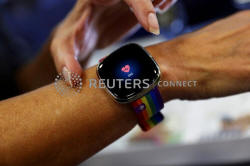|
The
home has become the center of activities with children learning
and playing games online and adults working from home, juggling
video calls, shopping digitally and conducting doctors'
appointments virtually.
"The onset of the COVID-19 pandemic was like a time machine that
suddenly propelled us tens of years into the future," said Paul
Silverglate, vice chairman at Deloitte, the multinational
professional services company.
"It has changed how we interact with our connected devices,
ultimately helping consumers, healthcare providers, education
professionals, technology innovators and others adapt, innovate
and thrive in our daily lives," he said.
Fitness has surfaced as a key theme in the Deloitte survey with
58% households having a smartwatch or fitness tracker, while 14%
of the device owners bought their fitness gadgets after the
start of the pandemic.
About 55% of the people use their gadgets to measure walking
steps and athletic performance, track heart health and monitor
sleep and calories.
Despite the increase in the number of devices, one-third of
survey respondents admit to feeling overwhelmed by the devices
and subscriptions they need to manage.
(Reporting by Supantha Mukherjee, European Technology & Telecoms
Correspondent, in Stockholm; Editing by Howard Goller)
[© 2021 Thomson Reuters. All rights
reserved.] Copyright 2021 Reuters. All rights reserved. This material may not be published,
broadcast, rewritten or redistributed.
Thompson Reuters is solely responsible for this content.

|
|





